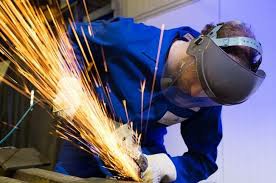


 349,500 Offered Certificates
349,500 Offered Certificates
 24/7 Online Training
24/7 Online Training
 Money Back Guarantee
Money Back Guarantee
 Fully Accredited Courses
Fully Accredited Courses

Created at: 22-02-2025 22:27
Abrasive wheels are an essential tool in many industries, including construction, manufacturing, and fabrication. While they offer incredible benefits, improper handling can lead to serious accidents and injuries. In Dublin, Cork, Galway, Limerick, Waterford, and other major cities across Ireland, it’s crucial for workers to understand the common mistakes associated with Abrasive Wheels and the role that effective training plays in mitigating these risks.
Abrasive wheels can cause significant injuries such as lacerations, fractures, and even fatalities if not handled properly. Workers often underestimate these risks, leading to careless mistakes during operation. Let's dive into the most common errors workers make when using these tools and how targeted training can help.
One of the frequent mistakes made by workers involves using the wrong type of abrasive wheel for a specific task. For instance, opting for a metal-cutting wheel instead of a masonry wheel can lead to subpar results and accidents.
Proper training ensures that workers are familiar with the different types of abrasive wheels available and understand which types are suitable for specific applications.
Many workers fail to conduct necessary risk assessments before using abrasive wheels. These assessments help identify potential hazards and put appropriate measures in place to mitigate risks.
Regular safety training empowers employees to recognize the importance of conducting thorough risk assessments, paving the way for safer work practices.
Adhering to established safety procedures is critical when using abrasive wheels. This includes using personal protective equipment (PPE), such as goggles, gloves, and face shields.
Training programs that emphasize the importance of PPE and safety protocols can drastically reduce the likelihood of such accidents.
Failure to inspect and maintain abrasive wheels is another common issue. Wheels that are worn out or damaged can break during use, leading to catastrophic outcomes.
Regular training on the importance of equipment checks and proper maintenance procedures increases the likelihood that workers will perform necessary inspections diligently.
Many workers overlook the need for formal education on abrasive wheels. Without proper training, they may not understand the risks involved or the techniques for safe operation.
Engaging in certified abrasive wheels training, such as the Abrasive Wheels Course Dublin offers, is essential for equipping workers with the knowledge needed to operate machinery safely.
The key to averting accidents associated with abrasive wheels lies in comprehensive training. Here's how:
Training programs tailored to local industries—such as the Abrasive Wheels Certification Ireland offers—can make a significant difference in workplace safety. By implementing these programs in cities like Cork and Galway, businesses can create a culture of safety, ultimately leading to fewer accidents and healthier work environments.
Workers in Dublin, Cork, Galway, Limerick, Waterford, and beyond can greatly reduce the risks associated with abrasive wheel usage through proper training and adherence to safety protocols. Companies should invest in certified abrasive wheels training for their employees to ensure everyone is equipped with the knowledge and skills necessary to operate these tools safely.
To find out more about certified Abrasive Wheels training near you, contact us at [email protected] or visit our Abrasive Wheels Course page for details on available courses in your area. Enhance safety in your workplace today!